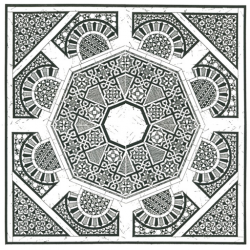The controversial subversion of the iconic last supper of Jesus into a LGBTQ, Dionysusian tableau at the 2024 Paris Olympics has raised the ire of Christians around the world. Why would France promote such imagery at a forum that would be broadcast worldwide?
It is a manifestation of an ongoing process in which radically secular societies, acting according to an internal cultural colonial impulse, periodically lampoon or radically subvert sacred icons, images, and sacred personages. They cannot help themselves.
Reversing or overturning the values and meanings traditionally associated with religious iconography and personages, is a common mechanism to deaden the seriousness and sacredness with which a religion’s metaphysical connections are viewed.
In the Olympic tableau, Jesus and his disciples are substituted with an array of characters representing a modern secular vision of humanity. A key element of Christianity, the last supper, (referred to in the Qur’an as “the table spread from heaven”) becomes a Dionysusian feast.
The food, and drink, instead of being related to God and to Jesus, is related to Dionysus. A sacred image and it’s traditional metaphysical meaning is trampled upon. This process of mockery and subversion is a natural byproduct of a world in which religion has been undercut.
Religion has been bypassed, or legislated into insignificance, and its influence rendered innocuous and irrelevant within the political, economic, and power structures of the secular system. And In such a world, religion is relegated primarily to the private sphere.
And, even in the private sphere, those who immerses themselves too deeply in it are liable to be considered eccentric, peculiar, or suspect – and those who try to organize their outward life according to religious dictates are viewed as a danger or an affront to secular values.
This is the emerging and (currently) dominant reality (especially strong in France) – and any dominant force naturally does what is necessary to secure and solidify its position.
In such a situation, the greatest annoyance and danger is from those who have not sufficiently acquiesced to the new state of affairs, and who insist on clinging to “outmoded” paradigms, to ways of thinking that have little to do with the “real” (I.e., secular) worldview.
Undercutting the sacred foundational, metaphysical symbols which are the outward form of an inward belief can, over time, neutralize or modify the thinking of a significant portion of the religious population.
Even if this has little impact on the followers of the religion, it is useful domestically in stereotyping and negatively objectifying that which is considered a danger to secular society (thus undermining its influence).
Symbols, texts, images, iconic personages, and rituals are the architecture, the geometry, the symbolic worldly aspect, the formalized representation of metaphysical realities and of the human connection to these realities. Jesus at the last supper is a profound iconic image.
Demolition of images that depict the sacred, and thereby of the persons and the meaning depicted, is part of the secular process of undermining and discarding the infrastructure of religion.
Once this demolition is underway, the refugees are then invited to take shelter instead among the symbols of secular society. The weakening of the metaphysical symbols is accomplished in part by attempting to turn the traditional meanings connected with the symbols upside down.
Whatever the merits and critical prowess of the responsible artist may be, it is clear that a very debased inversion of meaning was attached (intentionally or unintentionally) to traditionally sacred images, personalities, and iconography when this tableau was greenlighted.
Traditional religious art is a sort of visual metaphysics, but the art (in this case, tableau, based on a classical religious painting) that mocks religion cuts at the metaphysical connections seeking to sever them with a stroke of the brush or distorted imitative performance art.
So, to the majority of Christians, this is likely not viewed as simply art or visual commentary or even comic caricature but as a provocation and a deliberate expression of rancor towards the foundations of their faith, masquerading, feebly, under the guise of artistic license.
This, along with much other visual foolishness displayed during the opening ceremony, betokens societies in the process of losing their way and the decay of metaphysical and hence truly human values. The blood spilled in the ongoing vicious wars of the West are a case in point.
The process of desacralization and debasment of religious iconography is likely to strengthen and increase in frequency and is an unfortunate and unsavory aspect of a much broader, far reaching, long term philosophical shift.
If religious people, and by this I mean those who have a deep understanding of their religion, of the metaphysics underlying the truths of their faith and the importance of giving life here and now, to those truths – if they cede the public sphere and arenas to others, they will be faced with an ever shrinking religious landscape. One that is always on the defensive, always on the back foot, always retreating into an ever shrinking domain.
The massive assault of a modern power-based and power hungry secularism backed by a pervasive and submissive media is hard to resist.
The way forward is a rebuilding (with intelligence and deep knowledge of the metaphysical foundations of religion) religious structures, understanding the importance of the internal (esoteric) ethics and the external architecture (in the form of the actions) of ethical faith.
Otherwise, expect to see more debasing attacks upon sacred personages like Jesus, and inversion of the values depicted in sacred art and texts. Do not cede the public arena, the public spaces, art, media, public institutions, the legal and political machinery to other agendas.
Rather, expand into the societal spaces from which you have been driven, or from which you have voluntarily withdrawn over the decades. Do it with beauty, with carefully curated and applied ethics, with an elevated intention and intelligent action and speech. But do it – and do it with persistence and perseverance and patience. Religion weakened over decades, it will take decades to build a renewed and revitalized traditional infrastructure and regain its natural inbuilt metaphysical strength. Inshallah, and God knows best.
P.S. Although I have passionately argued that the modern conception of secularism will inevitably push back serious religion into the equivalent of reservations, limiting their scope, their mental reach, and their ability to act and bring about real change in the world. Change at the political societal level will be reserved for the secular worldview, even as it mutates and transforms from the original idea of secularism into modern forms wedded to power, and for manufacturing consent for its ideological goals.
At one time there was some benefit to a secular approach that promised a non-discriminatory level field for all religions, lessening the possibility of conflict between groups and eliminating the possibility of government and class bias and favouritism within society. However, that is different in France, where the notion of a level field is instead replaced by laicite which has ever more strongly sought to implement the idea of completely excluding religious visibility and ideas from the public domain.
However, this is implemented with an uneven hand so that some religious groups suffer far more strongly under laicite than others. This unevenness will likely grow in the future producing more conflict in the society. So, in France secularism and laicite have produced greater discrimination, eliminated the level playing field, and pushed hard to promote the acceptance of modern ideologies that have a negative impact on certain religions if not all religions in general.
Of course, if it were to come about that thoughtful religious groups reverse this direction to some extent, while striving to maintain a level field among different groups, there would still be natural difference, opinions, ideas and it would require constant adjustment to maintain that level field where no one group experiences discrimination. So it is not as if problems vanish with the disappearance of laicite, but it would certainly be an improvement on the current extremely discriminatory situation.
twitter(X): @i_from_i
Another blog: islam from inside

